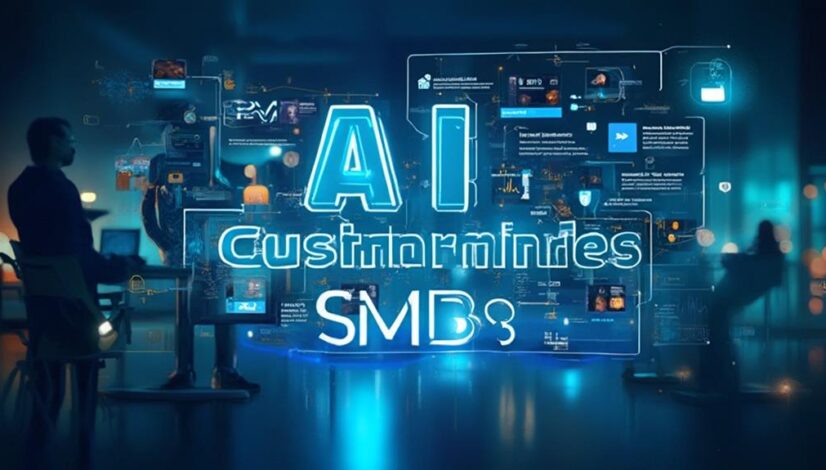How AI Is Revolutionizing Customer Service in SMBS
AI is revolutionizing customer service in small and medium-sized businesses (SMBs) by streamlining operations and enhancing personalization. AI-driven chatbots provide instant support, improving response times and customer satisfaction. Tools like predictive analytics offer insights into customer needs and preferences, fostering tailored interactions that boost loyalty. Additionally, AI streamlines processes, ultimately reducing operational costs and allowing for scalability. As consumer expectations evolve towards immediate and personalized service, the integration of AI technologies becomes essential for competitiveness. To explore how these advancements can specifically impact your business, there's much more to discover about AI's transformative role in customer service.
Key Takeaways
- AI-driven chatbots provide 24/7 customer support, enhancing engagement and operational efficiency for SMBs.
- Personalized customer interactions using data analytics foster loyalty and meet evolving consumer expectations for immediate responses.
- Predictive analytics empower SMBs to anticipate customer needs, informing marketing strategies and improving personalization.
- Automation of processes reduces operational costs and response times, streamlining customer service workflows for SMBs.
- Ongoing investment in AI technologies allows SMBs to remain competitive and deliver exceptional customer experiences.
AI-Driven Chatbots and Virtual Assistants

Revolutionizing customer interactions, AI-driven chatbots and virtual assistants have emerged as essential tools in the modern service landscape. As businesses increasingly seek to enhance customer experience while maintaining operational efficiency, these AI solutions provide a robust platform for real-time engagement. They empower customers to seek support anytime, conveniently, aligning perfectly with an audience that values freedom of choice and accessibility.
Despite their numerous advantages, it is vital to acknowledge AI limitations. These systems often struggle with complex inquiries or nuanced emotional interactions, which can hamper user satisfaction. While AI chatbots are continually evolving, full mastery over human-like communication remains an ongoing challenge. Addressing this limitation requires ongoing investment and innovation, emphasizing the importance of managing user expectations to guarantee user acceptance and trust.
Moreover, effective implementation of AI chatbots hinges on their ability to seamlessly integrate into existing customer service frameworks. Businesses must prioritize transparency and inform users about the capabilities and limitations of these AI-driven tools. This approach facilitates a positive reception and encourages users to engage with the technology instead of viewing it as a barrier.
Personalized Customer Interactions
Personalized customer interactions are transforming the way businesses connect with their clients, fostering a deeper sense of engagement and loyalty. During a time when consumers crave individual attention, Small and Medium Businesses (SMBs) are leveraging AI technologies to enhance the customer experience by understanding user preferences effectively.
One primary strategy employed by SMBs is customer profiling, which involves creating detailed personas based on customer data. These profiles encompass demographics, purchasing history, and behavioral patterns, allowing businesses to tailor their interactions to meet specific needs. For instance, an e-commerce platform can send personalized recommendations to a returning customer, thereby enhancing their shopping experience and increasing the likelihood of conversion.
Moreover, AI-driven tools analyze real-time data to understand user preferences, ensuring that communication is not only relevant but also timely. This level of personalization enables SMBs to engage customers through preferred channels, whether it's via email, social media, or direct messaging. When clients feel recognized and valued, their loyalty naturally deepens.
Additionally, personalized interactions extend beyond mere marketing; they encompass customer service as well. By anticipating customer issues based on previous interactions, businesses can proactively address concerns, thereby building trust and rapport.
Data Analytics and Insights

Harnessing the power of data analytics, businesses can extract valuable insights that drive informed decision-making and enhance customer service strategies. In today's competitive landscape, understanding customer behavior is more essential than ever. Through advanced data analytics, companies can monitor interactions, preferences, and purchasing patterns, revealing nuanced trends that remain hidden to the naked eye.
Predictive analytics plays a pivotal role in this process. By leveraging historical data, businesses can forecast customer needs and behaviors, allowing them to tailor their services and offerings proactively. For instance, small and medium-sized businesses (SMBs) can predict peak demand periods or identify potential churn risks, enabling them to implement targeted retention strategies before any issues arise.
Moreover, these insights empower companies to segment their customer base effectively. Understanding different customer profiles means SMBs can deliver personalized experiences that resonate with diverse segments. This level of customization not only enhances customer satisfaction but also fosters loyalty, as clients feel understood and valued.
Furthermore, by evaluating data trends, businesses can identify gaps in their service offerings and uncover new opportunities for growth. This iterative process of learning from data continually informs strategy, ensuring companies remain agile and responsive to changing customer expectations.
Efficiency and Cost Reduction
In the fast-paced world of customer service, efficiency and cost reduction have become paramount for businesses seeking to thrive. Small and medium-sized businesses (SMBs) are increasingly turning to artificial intelligence to achieve these goals, as advanced technologies empower them to streamline operations while maintaining exceptional service quality.
One of the most significant benefits of AI in customer service is the implementation of automated ticketing systems. By intelligently routing customer inquiries and categorizing issues, these systems minimize response times and eliminate bottlenecks that can frustrate customers and employees alike. This automation not only enhances the customer experience by ensuring timely resolutions but also reduces the labor costs associated with manual ticket management, allowing staff to focus on more complex tasks.
Moreover, AI supports process optimization through insightful data analysis. By evaluating past interactions and identifying trends, AI solutions can guide businesses in refining their workflows. For instance, customer service representatives gain access to real-time insights that inform their responses, enabling them to engage effectively and resolve issues swiftly.
This reliance on AI-driven insights leads to improved operational efficiency, as resources are allocated where they will have the most significant impact. Ultimately, the integration of AI into customer service processes allows SMBs to reduce costs while enhancing their service capabilities.
This revolutionary transformation not only fosters a more responsive environment but also liberates businesses to innovate and grow, ensuring they remain competitive in an ever-evolving marketplace.
Future Trends in AI Customer Service

The future of AI in customer service is poised for transformative innovations that promise to enhance customer interactions greatly. As businesses increasingly adopt sophisticated technologies, advancements in natural language processing (NLP) and automated response systems are set to redefine the customer experience, making it more seamless and intuitive.
NLP, which enables machines to understand and respond to human language effectively, will lead to more personalized interactions. Customers will no longer feel they are speaking to a faceless chatbot; instead, they will engage with AI that understands context, sentiment, and intent. This human-like understanding creates a deeper rapport between businesses and their customers, fostering loyalty and satisfaction.
Moreover, the integration of automated response systems will streamline operations, allowing companies to handle inquiries at unprecedented speeds. These systems will evolve to resolve more complex issues while maintaining a personal touch. Automation will empower customer service representatives to focus on higher-value tasks, promoting creative problem-solving and personalized service.
Another future trend includes predictive analytics, driven by AI, which allows businesses to anticipate customer needs based on previous interactions and behaviors. This proactive approach can greatly enhance the customer journey, offering solutions before issues arise.
Embracing these future trends will not only optimize operational efficiencies but also create a more liberated and responsive environment for customers. Organizations willing to invest in AI technologies stand to gain a competitive edge, ensuring they meet the ever-evolving expectations of the modern consumer.
How Can AI Cost-Effective Solutions Transform Customer Service in SMBs?
AI cost-effective solutions can revolutionize customer service in small and medium-sized businesses by automating support tasks, enhancing response times, and personalizing interactions. By leveraging ai for smbs, businesses can reduce overhead, boost customer satisfaction, and stay competitive in a fast-paced market, all while maintaining high-quality service standards tailored to client needs.
Frequently Asked Questions
How Does AI Impact Employee Training in Customer Service Roles?
AI substantially influences employee training in customer service roles by facilitating AI training programs that tailor learning experiences to individual needs.
These programs enhance skill enhancement, allowing employees to acquire essential competencies more rapidly and effectively.
By utilizing data-driven insights, organizations can identify skill gaps and optimize training content, ultimately empowering employees to deliver exceptional customer service.
This innovative approach not only boosts confidence but also supports a culture of continuous improvement and professional growth.
What Are the Ethical Considerations of Using AI in Customer Service?
As AI technology permeates customer service, a striking 84% of consumers express concerns regarding data privacy.
Ethical considerations surrounding AI involve ensuring the responsible handling of personal information while addressing bias mitigation.
Companies must actively work to eliminate algorithms that perpetuate discrimination, promoting transparency and fairness in AI systems.
Can Small Businesses Afford AI Technology for Customer Service?
Many small businesses may perceive AI technology for customer service as a costly endeavor; however, conducting a cost-benefit analysis reveals that budget-friendly solutions exist.
These technologies can streamline operations, enhance customer engagement, and ultimately reduce service costs. By investing in scalable AI tools, small businesses can improve efficiency and customer satisfaction without straining financial resources.
Embracing AI offers a path to operational freedom and competitive advantage, making it an accessible option for forward-thinking entrepreneurs.
How Do Customers Generally Feel About Interacting With Ai?
Interacting with AI often provides a delightful experience for customers, enhancing convenience while offering swift responses to inquiries.
This technology has been generally embraced, as it facilitates seamless transactions and helps satisfy customer needs efficiently.
The growing trend of AI acceptance aligns with increasing customer satisfaction, as users appreciate the innovative solutions that AI presents.
Ultimately, customers enjoy the freedom and flexibility of engaging with intelligent systems, enhancing their overall service experience.
What Are Common Challenges Faced When Implementing AI in SMB Customer Service?
Implementing AI in customer service within small and medium-sized businesses (SMBs) presents several challenges.
Key issues include ensuring data privacy, as customers increasingly demand rigorous protection of their personal information.
Additionally, system integration poses hurdles; many SMBs utilize legacy systems that may not easily accommodate advanced AI solutions.
Addressing these concerns effectively is crucial for leveraging AI's potential while maintaining customer trust and operational efficiency in an increasingly competitive landscape.
Conclusion
The integration of AI into customer service practices among small and medium-sized businesses is markedly enhancing operational efficiency and customer satisfaction. Research indicates that 80% of businesses are projected to adopt chatbots by 2025, signaling a significant shift toward automation in customer interactions. As AI continues to evolve, it will further personalize experiences, streamline operations, and provide valuable insights, establishing a new standard for customer engagement and support in the SMB landscape.




